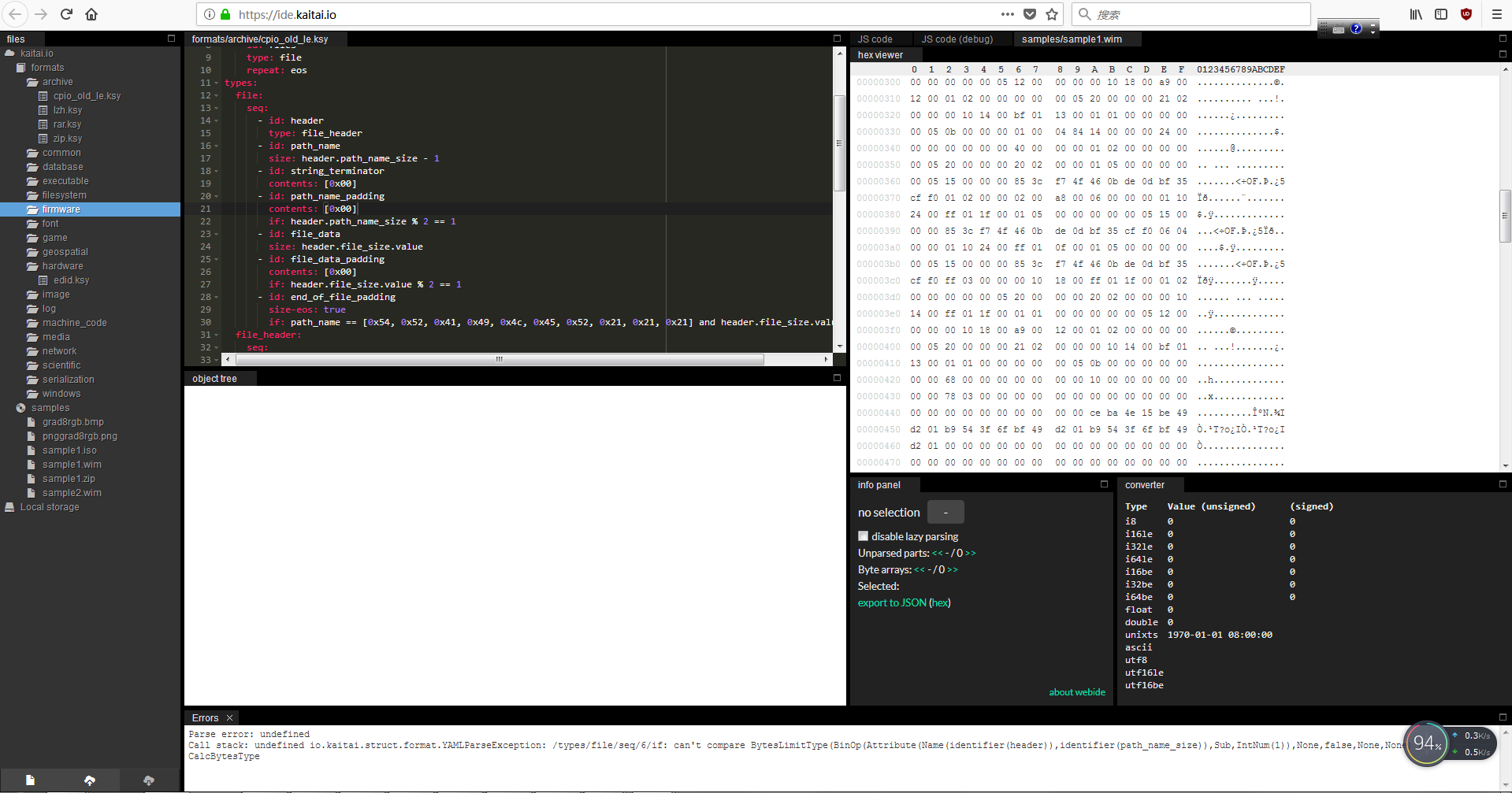I'm loving the web IDE so far, but it seems imports aren't working.
localforage.js:836 [performance/29.891] YAML parsing took 1 milliseconds.
localforage.js:836 import yaml: date, mode: rel
localforage.js:836 import yaml: date, mode: rel
localforage.js:836 GET https://ide.kaitai.io/formats/date.ksy 404 ()
send @ jquery-3.1.1.min.js:4
ajax @ jquery-3.1.1.min.js:4
get @ /js/app.files.js:55
(anonymous) @ /js/app.js:37
importYaml @ /js/app.js:35
$c_Lio_kaitai_struct_format_JavaScriptClassSpecs.doImport__T__T__s_concurrent_Future @ kaitai-struct-compiler-fastopt.js:68200
$c_Lio_kaitai_struct_precompile_LoadImports.io$kaitai$struct$precompile$LoadImports$$loadImport__T__sci_List__s_Option__s_concurrent_Future @ kaitai-struct-compiler-fastopt.js:7953
(anonymous) @ kaitai-struct-compiler-fastopt.js:7825
$c_Lio_kaitai_struct_precompile_LoadImports.processClass__Lio_kaitai_struct_format_ClassSpec__s_concurrent_Future @ kaitai-struct-compiler-fastopt.js:7838
$c_Lio_kaitai_struct_Main$.importAndPrecompile__Lio_kaitai_struct_format_ClassSpecs__Lio_kaitai_struct_RuntimeConfig__s_concurrent_Future @ kaitai-struct-compiler-fastopt.js:4719
$c_Lio_kaitai_struct_MainJs$.compile__T__sjs_js_Object__Lio_kaitai_struct_JavaScriptImporter__Z__sjs_js_Promise @ kaitai-struct-compiler-fastopt.js:4892
$c_Lio_kaitai_struct_MainJs$.$$js$exported$meth$compile__T__sjs_js_Object__Lio_kaitai_struct_JavaScriptImporter__Z__O @ kaitai-struct-compiler-fastopt.js:4821
$c_Lio_kaitai_struct_MainJs$.compile @ kaitai-struct-compiler-fastopt.js:4945
compile @ /js/app.js:100
copyPromise.then.then @ /js/app.js:127
Promise resolved (async)
copyPromise.then @ /js/app.js:126
Promise resolved (async)
localforage.getItem.then.ksyFsItem @ /js/app.js:123
Promise resolved (async)
req.onsuccess @ localforage.js:836
IndexedDB (async)
(anonymous) @ localforage.js:826
localforage.js:836 XHR finished loading: GET "https://ide.kaitai.io/formats/date.ksy".
send @ jquery-3.1.1.min.js:4
ajax @ jquery-3.1.1.min.js:4
get @ /js/app.files.js:55
(anonymous) @ /js/app.js:37
importYaml @ /js/app.js:35
$c_Lio_kaitai_struct_format_JavaScriptClassSpecs.doImport__T__T__s_concurrent_Future @ kaitai-struct-compiler-fastopt.js:68200
$c_Lio_kaitai_struct_precompile_LoadImports.io$kaitai$struct$precompile$LoadImports$$loadImport__T__sci_List__s_Option__s_concurrent_Future @ kaitai-struct-compiler-fastopt.js:7953
(anonymous) @ kaitai-struct-compiler-fastopt.js:7825
$c_Lio_kaitai_struct_precompile_LoadImports.processClass__Lio_kaitai_struct_format_ClassSpec__s_concurrent_Future @ kaitai-struct-compiler-fastopt.js:7838
$c_Lio_kaitai_struct_Main$.importAndPrecompile__Lio_kaitai_struct_format_ClassSpecs__Lio_kaitai_struct_RuntimeConfig__s_concurrent_Future @ kaitai-struct-compiler-fastopt.js:4719
$c_Lio_kaitai_struct_MainJs$.compile__T__sjs_js_Object__Lio_kaitai_struct_JavaScriptImporter__Z__sjs_js_Promise @ kaitai-struct-compiler-fastopt.js:4892
$c_Lio_kaitai_struct_MainJs$.$$js$exported$meth$compile__T__sjs_js_Object__Lio_kaitai_struct_JavaScriptImporter__Z__O @ kaitai-struct-compiler-fastopt.js:4821
$c_Lio_kaitai_struct_MainJs$.compile @ kaitai-struct-compiler-fastopt.js:4945
compile @ /js/app.js:100
copyPromise.then.then @ /js/app.js:127
Promise resolved (async)
copyPromise.then @ /js/app.js:126
Promise resolved (async)
localforage.getItem.then.ksyFsItem @ /js/app.js:123
Promise resolved (async)
req.onsuccess @ localforage.js:836
IndexedDB (async)
(anonymous) @ localforage.js:826
/#:1 Uncaught (in promise) Object {readyState: 4, getResponseHeader: function, getAllResponseHeaders: function, setRequestHeader: function, overrideMimeType: function…}
Promise rejected (async)
j @ jquery-3.1.1.min.js:2
k @ jquery-3.1.1.min.js:2
setTimeout (async)
(anonymous) @ jquery-3.1.1.min.js:2
i @ jquery-3.1.1.min.js:2
fireWith @ jquery-3.1.1.min.js:2
fire @ jquery-3.1.1.min.js:2
i @ jquery-3.1.1.min.js:2
fireWith @ jquery-3.1.1.min.js:2
A @ jquery-3.1.1.min.js:4
(anonymous) @ jquery-3.1.1.min.js:4
XMLHttpRequest.send (async)
send @ jquery-3.1.1.min.js:4
ajax @ jquery-3.1.1.min.js:4
get @ /js/app.files.js:55
(anonymous) @ /js/app.js:37
importYaml @ /js/app.js:35
$c_Lio_kaitai_struct_format_JavaScriptClassSpecs.doImport__T__T__s_concurrent_Future @ kaitai-struct-compiler-fastopt.js:68200
$c_Lio_kaitai_struct_precompile_LoadImports.io$kaitai$struct$precompile$LoadImports$$loadImport__T__sci_List__s_Option__s_concurrent_Future @ kaitai-struct-compiler-fastopt.js:7953
(anonymous) @ kaitai-struct-compiler-fastopt.js:7825
$c_Lio_kaitai_struct_precompile_LoadImports.processClass__Lio_kaitai_struct_format_ClassSpec__s_concurrent_Future @ kaitai-struct-compiler-fastopt.js:7838
$c_Lio_kaitai_struct_Main$.importAndPrecompile__Lio_kaitai_struct_format_ClassSpecs__Lio_kaitai_struct_RuntimeConfig__s_concurrent_Future @ kaitai-struct-compiler-fastopt.js:4719
$c_Lio_kaitai_struct_MainJs$.compile__T__sjs_js_Object__Lio_kaitai_struct_JavaScriptImporter__Z__sjs_js_Promise @ kaitai-struct-compiler-fastopt.js:4892
$c_Lio_kaitai_struct_MainJs$.$$js$exported$meth$compile__T__sjs_js_Object__Lio_kaitai_struct_JavaScriptImporter__Z__O @ kaitai-struct-compiler-fastopt.js:4821
$c_Lio_kaitai_struct_MainJs$.compile @ kaitai-struct-compiler-fastopt.js:4945
compile @ /js/app.js:100
copyPromise.then.then @ /js/app.js:127
Promise resolved (async)
copyPromise.then @ /js/app.js:126
Promise resolved (async)
localforage.getItem.then.ksyFsItem @ /js/app.js:123
Promise resolved (async)
req.onsuccess @ localforage.js:836
IndexedDB (async)
(anonymous) @ localforage.js:826
localforage.js:836 GET https://ide.kaitai.io/formats/date.ksy 404 ()
send @ jquery-3.1.1.min.js:4
ajax @ jquery-3.1.1.min.js:4
get @ /js/app.files.js:55
(anonymous) @ /js/app.js:37
importYaml @ /js/app.js:35
$c_Lio_kaitai_struct_format_JavaScriptClassSpecs.doImport__T__T__s_concurrent_Future @ kaitai-struct-compiler-fastopt.js:68200
$c_Lio_kaitai_struct_precompile_LoadImports.io$kaitai$struct$precompile$LoadImports$$loadImport__T__sci_List__s_Option__s_concurrent_Future @ kaitai-struct-compiler-fastopt.js:7953
(anonymous) @ kaitai-struct-compiler-fastopt.js:7825
$c_Lio_kaitai_struct_precompile_LoadImports.processClass__Lio_kaitai_struct_format_ClassSpec__s_concurrent_Future @ kaitai-struct-compiler-fastopt.js:7838
$c_Lio_kaitai_struct_Main$.importAndPrecompile__Lio_kaitai_struct_format_ClassSpecs__Lio_kaitai_struct_RuntimeConfig__s_concurrent_Future @ kaitai-struct-compiler-fastopt.js:4719
$c_Lio_kaitai_struct_MainJs$.compile__T__sjs_js_Object__Lio_kaitai_struct_JavaScriptImporter__Z__sjs_js_Promise @ kaitai-struct-compiler-fastopt.js:4892
$c_Lio_kaitai_struct_MainJs$.$$js$exported$meth$compile__T__sjs_js_Object__Lio_kaitai_struct_JavaScriptImporter__Z__O @ kaitai-struct-compiler-fastopt.js:4821
$c_Lio_kaitai_struct_MainJs$.compile @ kaitai-struct-compiler-fastopt.js:4945
compile @ /js/app.js:101
copyPromise.then.then @ /js/app.js:127
Promise resolved (async)
copyPromise.then @ /js/app.js:126
Promise resolved (async)
localforage.getItem.then.ksyFsItem @ /js/app.js:123
Promise resolved (async)
req.onsuccess @ localforage.js:836
IndexedDB (async)
(anonymous) @ localforage.js:826
localforage.js:836 XHR finished loading: GET "https://ide.kaitai.io/formats/date.ksy".
send @ jquery-3.1.1.min.js:4
ajax @ jquery-3.1.1.min.js:4
get @ /js/app.files.js:55
(anonymous) @ /js/app.js:37
importYaml @ /js/app.js:35
$c_Lio_kaitai_struct_format_JavaScriptClassSpecs.doImport__T__T__s_concurrent_Future @ kaitai-struct-compiler-fastopt.js:68200
$c_Lio_kaitai_struct_precompile_LoadImports.io$kaitai$struct$precompile$LoadImports$$loadImport__T__sci_List__s_Option__s_concurrent_Future @ kaitai-struct-compiler-fastopt.js:7953
(anonymous) @ kaitai-struct-compiler-fastopt.js:7825
$c_Lio_kaitai_struct_precompile_LoadImports.processClass__Lio_kaitai_struct_format_ClassSpec__s_concurrent_Future @ kaitai-struct-compiler-fastopt.js:7838
$c_Lio_kaitai_struct_Main$.importAndPrecompile__Lio_kaitai_struct_format_ClassSpecs__Lio_kaitai_struct_RuntimeConfig__s_concurrent_Future @ kaitai-struct-compiler-fastopt.js:4719
$c_Lio_kaitai_struct_MainJs$.compile__T__sjs_js_Object__Lio_kaitai_struct_JavaScriptImporter__Z__sjs_js_Promise @ kaitai-struct-compiler-fastopt.js:4892
$c_Lio_kaitai_struct_MainJs$.$$js$exported$meth$compile__T__sjs_js_Object__Lio_kaitai_struct_JavaScriptImporter__Z__O @ kaitai-struct-compiler-fastopt.js:4821
$c_Lio_kaitai_struct_MainJs$.compile @ kaitai-struct-compiler-fastopt.js:4945
compile @ /js/app.js:101
copyPromise.then.then @ /js/app.js:127
Promise resolved (async)
copyPromise.then @ /js/app.js:126
Promise resolved (async)
localforage.getItem.then.ksyFsItem @ /js/app.js:123
Promise resolved (async)
req.onsuccess @ localforage.js:836
IndexedDB (async)
(anonymous) @ localforage.js:826
/#:1 Uncaught (in promise) Object {readyState: 4, getResponseHeader: function, getAllResponseHeaders: function, setRequestHeader: function, overrideMimeType: function…}
Kaitai WebIDE version: 0.1.0.2207 (license)
Kaitai compiler version: 0.7 (2017-04-26 20:06:21.086)
Chrome version 58.0.3029.110 (64-bit)
Windows 10 64-bit





